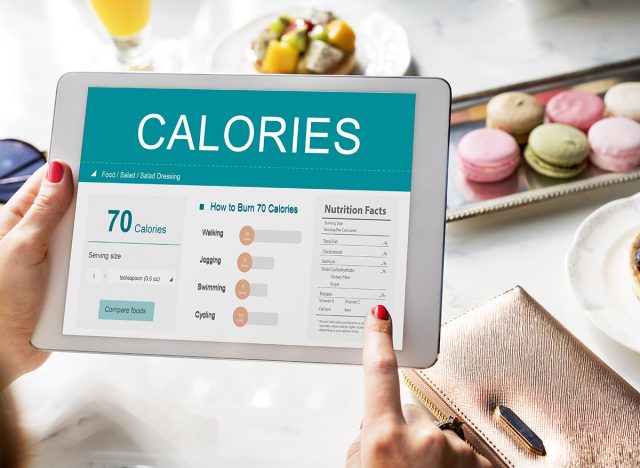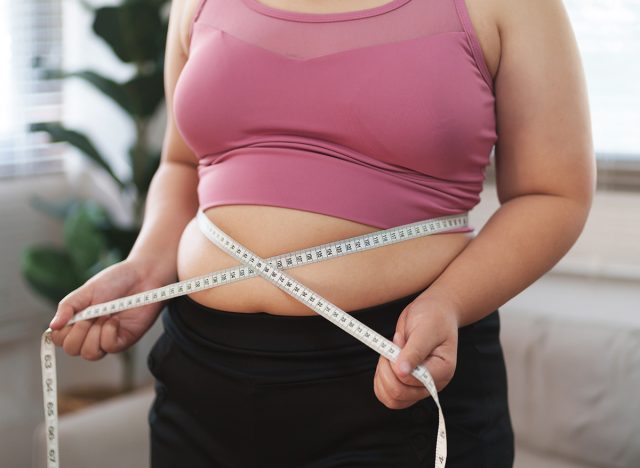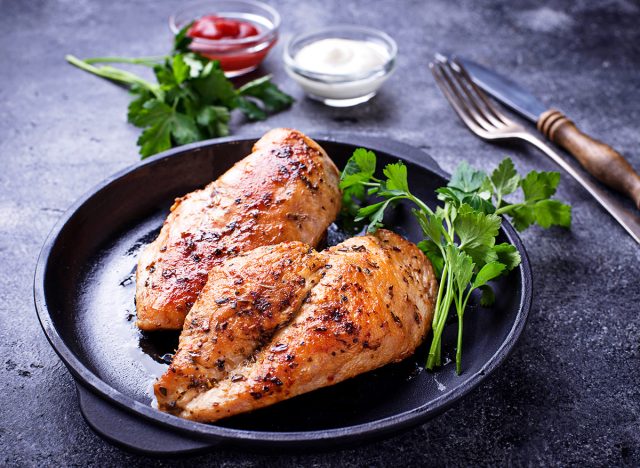7 Weight Loss Myths You Should NEVER Follow, According to Expert

Weight loss coach Soraya (@project.s.lifestyle) is a diet and fitness influencer with well over 300K followers on TikTok, and she has plenty to say about healthy—and in this case, not so healthy—ways to lose weight. Clearly frustrated by the massive amount of bad fitness information floating around online, Soraya put together a video debunking some of the silliest and most dangerous weight loss myths that could be derailing your wellness routine. Here are 7 weight loss myths Soraya wants you to never follow. Read on to find out!
Detoxing Works
@project.s.lifestyle Common weight loss tips I hear that don't work and actually make things a lot worse ❌❌ Head to the 🔗 in my profile for personalized coaching 📲 #weightlosscoach #fatlosscoach #weightlosstips ♬ Aesthetic – Tollan Kim
Soraya emphasizes the point that the human body is perfectly capable of detoxing itself without the need for expensive supplements or juices. "This is a complete waste of your time," she says, advising that the best "detox" is simply to get back into a good routine as soon as possible. "Detoxing, as commonly marketed in the form of diets, supplements, or procedures, is often based on the premise that your body needs help getting rid of toxins," says celebrity personal trainer Kollins Ezekh. "However, the human body is already equipped with its own highly efficient detoxification systems. Organs like the liver, kidneys, digestive system, skin, and lungs are constantly working to process and eliminate toxins. These natural systems are usually very effective, provided they are healthy and functioning properly."
Everyone Needs the Same Calories

This is important! Soraya reminds followers calorie requirements change from person to person, depending on weight and lifestyle factors. Limiting calories too much can backfire and negatively impact workouts. "The amount of calories that you need to be eating is going to be customized based on your height, weight, goals, activity, a lot of different factors," she says.
Related: Kim Kardashian's Trainer Shows Her "Perfect Body" and Reveals How She Overcame YoYo Dieting
Blast Your Belly Fat

No one exercise is going to blast any body part, let alone belly fat. A decent diet and workout routine will help with a sensible calorie deficit, which will lead to fat loss everywhere. "You can't spot reduce fat," Soraya insists. "Spot exercises, such as sit-ups, can tighten abdominal muscles but won't get at visceral fat," say the experts at Harvard Health. "Exercise can also help keep fat from coming back."
Exercise More To Cover Diet

There is no need to go crazy over-exercising because you ate more calories than intended over the weekend. Simply return to your normal health and fitness routine without trying to "make up" for the extra food. "I used to be guilty of this working out more because you ate more," Soraya admits.
RELATED: 5 Signs You Are Burning Fat While Exercising
Waist Trainers

Soraya is blunt about the uselessness of waist trainers for weight loss. "Save your money," she says. Waist trainers might force you to eat less, but this is not a long-term solution. In fact, wearing a waist trainer could be downright dangerous. "There is a lot of damage on the organs because they're shifting, stretching the vessels around," hepatologist Jamile Wakim-Fleming, MD, tells the Cleveland Clinic. "This causes people to report more gas because gas is retained, which causes bloating."
Grilled Chicken Is Best

Grilled chicken is a stereotypical high-protein meal option, but don't feel trapped in a chicken rut. There are so many other options! "Tempeh, tofu, ground turkey, Greek yogurt, eggs. There's a bunch of really yummy protein snacks," Soraya advises.
Related: 12 Best Foods For Men to Build Muscle
Slow and Steady Wins the Race

It's boring but true—if you want to lose weight, and more importantly, keep it off, good lifestyle habits will take you there. Detoxing and waist trainers will not! "That's exactly what to help my clients do inside my coaching program," Soraya says. "Proper nutrition supports overall health, which is essential for consistent and effective exercise," Ezekh says.
💪🔥Body Booster: Nothing is more effective for weight loss than a consistent, sensible diet and workout routine. There are no shortcuts! Take it one day at a time.




